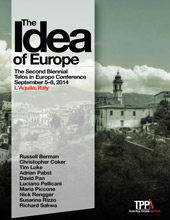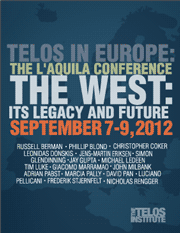 I thank very much the organizers for this opportunity to discuss “The Idea of Europe.” Among the several specific topics for discussion suggested in the conference outline, my paper will address the question: “Universalism or exceptionalism?” Now, in the context of this conference, this question might be understood either in historical-political or in philosophical terms, or somehow in both. And it is my contention that, in “the Idea of Europe” the historical-political and the philosophical as such substantially converge. In other words, in “the idea,” with its philosophical complexities, we should be able to find the trace of the decisive rupture in historical time—event, exception—that gave rise to modern Europe and conferred a particular direction, a primordial bias to its temporal unfolding; a bias not opposed to modern reason’s universalism, and inherently beyond the reach of its critical powers.
I thank very much the organizers for this opportunity to discuss “The Idea of Europe.” Among the several specific topics for discussion suggested in the conference outline, my paper will address the question: “Universalism or exceptionalism?” Now, in the context of this conference, this question might be understood either in historical-political or in philosophical terms, or somehow in both. And it is my contention that, in “the Idea of Europe” the historical-political and the philosophical as such substantially converge. In other words, in “the idea,” with its philosophical complexities, we should be able to find the trace of the decisive rupture in historical time—event, exception—that gave rise to modern Europe and conferred a particular direction, a primordial bias to its temporal unfolding; a bias not opposed to modern reason’s universalism, and inherently beyond the reach of its critical powers.
|
The following paper was presented at Telos in Europe: The L’Aquila Conference, held on September 7-9, 2012, in L’Aquila, Italy.
Are we not floundering today? Isn’t this, at least in part, what we need to understand, to make intelligible? So we might look out for writings, wherever they come from, that speak to and speak from this world, a world which today, it seems, more than ever, “wears as it grows.” |
||||
|
Telos Press Publishing · PO Box 811 · Candor, NY 13743 · Phone: 212-228-6479 Privacy Policy · Data Protection Copyright © 2024 Telos Press Publishing · All Rights Reserved |
||||
 How should we conceive the distinctive character, the “particular rarity,” of the wearing and growing of the contemporary world? How should we come to terms with our time? What words can we find that are fitting for its specificity when so many of the words we have found fitting hitherto, especially promising words about the course of human history and its political hopes, its hopes in the political (modernity, Enlightenment, civilization, socialism, etc.) sound more and more like the road signs of another age?
How should we conceive the distinctive character, the “particular rarity,” of the wearing and growing of the contemporary world? How should we come to terms with our time? What words can we find that are fitting for its specificity when so many of the words we have found fitting hitherto, especially promising words about the course of human history and its political hopes, its hopes in the political (modernity, Enlightenment, civilization, socialism, etc.) sound more and more like the road signs of another age? 






